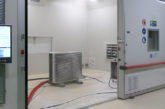
With the likes of Greta Thunberg and Extinction Rebellion gaining international attention this year, the focus on sustainable practices is very much in the spotlight. PHPI explores why the construction industry needs to lessen its carbon footprint, and asks manufacturers what they’re currently doing to combat excessive use of plastics and waste.
Not so long ago, climate change protesters were often perceived to be on the more ‘extreme’ end of the eco-warrior scale, occasionally causing a brief furore in the media and ultimatley garnering little attention for their actions. In 2019, this appears to have changed significantly. While not everyone is on the streets gluing themselves to banks and making powerful speeches in Washington, the impact our everyday actions are having on our planet is very much at the forefront of our minds.
The introduction of 5p plastic bags a few years ago was a good starting point, but now large organisations are going ever-further in their quests to appease customer concerns about their sustainable actions. Not long ago, Sainsbury’s became the “first supermarket” to dispose of plastic bags for fruit, vegetables and bakery items, while hotels are finally banning mini plastic toiletries, with reports suggesting that 200 million of them are dumped into landfills each year. And, with pleas from the likes of David Attenborough for everyone to take ownership and accept responsibility for their own sustainable practices, the issue is set to make its way into the working lives of installers, too.
Constructive criticism
To be blunt, this sector doesn’t have the best reputation with regards to sustainable practices. According to research from an industry retailer, the global construction industry produces 64 million tonnes of plastic a year, with a significant amount of these plastics taking nearly 1,000 years to decompose.
The same report indicated that 95% of tradespeople admit that the industry needs to reduce its plastic use. In a recent TradesTalk survey on the subject, nearly 90% of respondents agreed that sustainability in their work was important to them, while 100% said that manufacturers should use less wasteful packaging. Even if it doesn’t immediately affect your purchasing decisions, your customers may begin to ask questions about the sustainability credentials of the products they are having installed in their homes.
PHPI was recently approached regarding the issue by James Elmy (aka @the24hrplumber), which coincided with the growing concerns over plastic use in the plumbing and heating industry. We therefore set out to ask manufacturers how they are working to combat the issues. Products that naturally promote renewable practices aside (think heat pumps, solar and water-saving devices amongst others), single-use plastics, packaging and manufacturing processes all came into focus.
James commented: “I’ve always been keen on recycling and I’ve been looking for ways to do it within my business. I’ve found that some products I buy come in plastic containers or bags that are not recyclable. Plastic is polluting the planet and we need to look at ways of changing things now, or we’re going to leave the next generation in a whole heap of mess!”
Packing light
Product packaging is almost double the actual product size at times, frustrating installers and local bin collectors alike. Fortunately, it’s a bugbear that is now becoming a focus for companies looking to promote their sustainability credentials in every industry.
Single use plastic packaging is the scourge of the environment and companies such as Hilton Banks are now taking this on board. The HB42 All-in-One Sealant and Adhesive, for instance, is now available in 400ml foil packs, rather than in a single use plastic cartridge, and is said to produce around 95% less waste. Similarly, Fernox has recently reformulated its Express range to be sold in “fully recyclable canisters”, ensuring that installers can “safely recycle the packaging”.
Of course, packaging is part and parcel (excuse the pun) of distributing products safely and effectively. There are various examples of organisations working hard to ensure the process is as sustainable as possible, however. Take Lakes Showering Spaces, recently certified as a ‘carbon neutral’ company, which has “significantly reduced” its packaging waste to make it 100% recyclable. The new boxes have been reduced in size, while the cardboard is better quality, meaning plastic banding and polystyrene “are no longer required”.
Other companies include Bristan, which has been able to “reduce the overall weight by 31.6 tonnes per year” due to a new partnership, while Conex Bänninger, Aqualisa, Salamander Pumps, Marley Plumbing & Drainage and Vaillant all highlighted their increased use of recyclable materials and reduced sizes of packaging in recent months.
Of course, all of this reduced packaging isn’t just good for the environment, but also makes it much easier for installers to transport and dispose of materials.
Sustainable production
Companies are also working hard during the manufacturing process to reduce their carbon footprint, it seems. While for some, this is nothing new – Viessmann committed to environmentally responsible manufacturing back in 1992 – there are more innovative technologies that can now assist in this process. The German manufacturer’s newest factory, for example, now operates with CO2-neutral provision of heating, cooling and power, with a photovoltaic system providing 60% of the overall required power.
Many others now regularly review the amount of harmful materials and oils that are used in the production processes, while most ensure a commitment to using as many recycled materials as possible. Wavin uses old double-glazing window frames and other waste assets to produce its pipes, old plastic bottles form part of Armacell’s load bearing segments within ArmaFix pipe supports, while Polypipe’s new multi-layer core waste pipe has a minimum of 50% recycled material in its construction.
Of course, there is still much, much more to be done, but it is promising to see that manufacturers within this sector are keen to show a commitment to reducing their carbon footprint and use of plastics, in various guises. There are myriad other examples from companies we did not have room to mention here, and with promises of further efforts down the line – Triton Showers has set itself and its suppliers further commitments after achieving its “zero waste to landfill” goal two years early, for instance – the construction sector is clearly looking to step up its efforts.
Aside from a commitment to the planet, it makes sense for engineers to start taking an interest in sustainable trends. Growing legislative changes are surely abound, so it’s worth getting ahead of the game, while demonstrating your own commitment to the cause will only serve to increase your reputation as a professional installer. And, as consumers place ever greater importance on the topic, it may even help in winning you business further down the line.
For full details of the responses we received from manufacturers and merchants, click here













